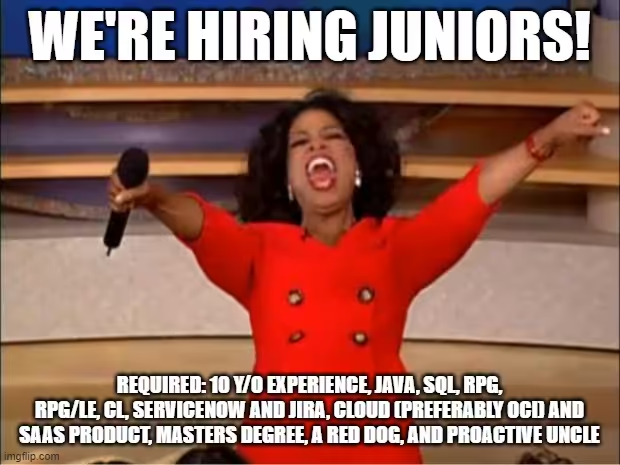This website uses cookies so that we can provide you with the best user experience possible. Cookie information is stored in your browser and performs functions such as recognising you when you return to our website and helping our team to understand which sections of the website you find most interesting and useful.
If you want to see through someone else’s eyes, you got to a walk a mile in their shoes.
At Net Group, we’ve been hiring junior talent for 25+ years. Some were good, some were great and are still with us today. Likewise, we made a lot of mistakes. Nowadays, the least we could offer is some much-needed perspective. So, here’s the truth.
Hiring junior talent is a risky business.
Will you adapt quickly? Will you bring value or need constant guidance? Will it cost us a lot more than we were able to get in a long haul?
You have to understand that companies are taking a gamble. They hope that you’ll grow and contribute without a steep learning curve or dusting off.
The moment you grasp this reality, everything changes. You start to see what hiring managers are looking for beyond the resume — the attitude, the readiness, the empathy, the potential to think beyond the usual.
And that simple shift in thinking? It’s your first step to standing out from your peers.
Getting an Internship Got Tougher
The job market has officially tightened.
The tech boom of recent years has leveled out, leading to a more “normalized” job market. With companies adopting a more cautious approach, they’re hiring fewer juniors and looking for candidates who can deliver immediate value. This is as true for Estonia as much as for the neighbouring EU countries.
According to Märt Ridala, head of Solita Estonia, “Getting an internship at an IT company or finding the first job in the sector is more difficult than two years ago.” He adds that this trend isn’t limited to IT — it’s a widespread phenomenon.
Companies now face a higher risk when hiring juniors. For this reason they’re more selective. As a consequence, most companies focus on those who not only have rich technical experience but also a deeper understanding of the business context.
Why Are Companies Slow to Hire Junior Software Developers?

1. High Training Costs with Uncertain Returns
Hiring junior talent requires significant time and resources for training. Companies invest in developing these individuals, but often, once they’ve gained enough experience, they leave for better opportunities. This high turnover makes the initial investment risky, as the company may not see a return on the resources spent.
2. Demand for Immediate Impact
Businesses today need developers who can contribute right away. Juniors often require months of onboarding before they become fully productive. Companies facing tight deadlines or complex projects prefer experienced hires who can jump in and start delivering results immediately.
3. Market Saturation of Entry-Level Candidates
The surge in coding boot camps and computer science graduates has flooded the market. While this increases competition for entry-level roles, it also gives companies the luxury of being more selective. They can afford to wait for candidates who possess “just what they need”.
4. Limited Bandwidth for Mentorship
Experienced developers often need to mentor juniors. This takes time away from their own work. In fast-paced environments, companies may not have the bandwidth to provide this guidance. As a result, they lean towards hiring seasoned professionals.
5. Economic Uncertainty
In times of economic uncertainty, companies tighten their budgets. They spend less on R&D and focus on roles that directly drive revenue. Junior positions and internships are often seen as long-term investments. In a bid to ensure stability, companies might cut back on these roles in favor of hiring professionals who can immediately contribute.
6. Remote Work Challenges
With remote work becoming the norm, training and mentoring junior talent have become more challenging. In-office environments made it easier for juniors to learn through direct interaction and spontaneous problem-solving. Remote setups require more structured training, which is resource-intensive and harder to manage.
7. Automation and AI Tools
The rise of automation and AI tools, like ChatGPT, has lessened the need for junior developers in some areas. Companies are leveraging these technologies to handle routine coding tasks. This reduces the reliance on entry-level talent.
7 Ways to Stand Out as a Junior Software Developer

We could have gone down the conventional path — ‘polish your resume, nail the basics, practice coding challenges’. But you’ve heard all that before, and we’re going to assume you’re already on top of it. We also mention the most important tips on How to get a job as a software developer.
Today, we’re diving into the things that really caught our eye during the hiring process. The moves that made junior candidates stand out, not by ticking boxes, but by thinking outside the box or, well, OK — ticking the right boxes!
#1 Show You’re In It for the Long Haul
Companies fear investing in juniors who’ll bolt at the first sign of a better offer. So, how do you prove you’re not just passing through?
Start by showing a genuine interest in the company’s long-term goals. Talk about their mission like it’s yours. Mention specific projects you’d love to contribute to. Bonus points if you map out a vision of how you see yourself growing there.
Offer to start with a trial period or internship. It says, “I’m confident enough to prove myself.” Highlight past experiences where you stuck around and made an impact.
Have a plan for your own growth too — certifications, ongoing learning, a commitment to get better not just for you, but for the team.
Flexibility, adaptability, eagerness to absorb like a sponge — companies notice that. Show you’re a future asset who’s ready to invest in them just as much as they’ll invest in you.
#2 Apply ONLY if You’ve Done the Project Relevant to the Job
Imagine you’re applying for a fintech company — they don’t just want to know you can code; they want to know you can code for them.
So, if you’ve built a financial tracker app or a feature that could seamlessly fit into their existing platform — pull off an all-nighter if that’s what it takes! Say it loud and clear in your application with a brief note: “I built this to demonstrate how I can contribute to your team.”
With so many candidates holding a microphone, you need a mic-drop.
You’re not just telling them you’re interested; you’re proving you can add value from day one.
#3 Show You’re One of Them
Technical skills are essential, sure, but companies are equally interested in who they’re hiring. Do you fit into their world? If their culture screams “innovation,” tell them about the side project you built just because you had a crazy idea at 2 a.m.
In Net Group, for instance, we’re much more into who. We love it when our candidates show a go-to attitude. Historically, with initiative, the rest usually falls into place at some point. Plus, those who fit stay around for a long, long time. Which, again, is the number #1 concern for most companies.
So if your ideal company relies on teamwork, share a quick story about how you spearheaded a hackathon project. Show them you’re not just another coder; you’re someone who vibes with their way of thinking. As cliche as this may sound, when your personality aligns with their culture, you’re not just an option, you’re a catch.
#4 Reach Out Directly to the Hiring Manager
Most people send an application and wait. You’re not most people.
Find out who the hiring manager is — LinkedIn is your friend here. Send a short, thoughtful message:
“Hey [Name], I just applied for the junior developer role. I’ve been following [Company] for a while and really admire your approach to [specific project/initiative]. Is there anything more I could do to demonstrate my fit for this role?”
You’re putting yourself on their radar and showing initiative.
Plus, it opens the door to feedback. Worst case? They don’t reply. Best case? You’ve just started a conversation that most candidates never think to have.
#5 Leverage Employee Referrals
If you’ve got a connection — use it.
This isn’t about nepotism; it’s about credibility. A referral from someone within the company who they trust can propel your application to the top of the pile. If you know an employee, ask them for a quick coffee chat to learn more about the company.
If you’re uncomfortable about this, don’t even ask for a referral — just show you’re interested.
People love to help. They also appreciate the sign of you deeming them important! If you can get them to understand your intention, you’re no longer a faceless resume; you’re a person who they know is keen on getting a job.
#6 Get Certified in Scrum or Agile
Most junior developers focus on the coding part. Needless to say, companies are also looking for someone who can navigate a sprint without getting winded.
Imagine you walk into the interview, and they ask if you’re familiar with Agile (which they do). Instead of the usual “Uh, I’ve read about it,” you whip out your certification.
Not only does this prove you’re serious about the role, but certifications in general are a great way to stand out on the job market. They’re tangible proof of your effort and commitment to mastering skills that matter.To let you in on their thought process: “Interesting, a junior dev who speaks our language…” You’re there to work smart, adapt, and thrive in their process — and you’ve got proof.
#7 Optimize Your LinkedIn Profile
This one is about ticking the right box. It’s also the one most junior candidates treat as an afterthought. You don’t want to do that.
9 out of 10 hiring managers will check your LinkedIn profile. If it’s blank, 9 out of the remaining 9 will opt out and look elsewhere. Simple as that.
So, tailor your headline to the roles you’re aiming for—something like, “Junior Developer with a Passion for Sustainability Startups.” Sprinkle relevant keywords throughout your profile. Recruiters are searching for those terms to find you and they do come with direct offers straight to your profile.
Don’t just list your skills; showcase them with brief but impactful descriptions: “Built a personal budgeting app using React and Firebase, gaining 100+ users in two months.”
Stuff your activity feed with all of the relevant work that you do. Let your profile read like the summary of a rising star—one they want on their team.
#8 Create Mini Projects or Case Studies
You know those “requirements” on the job listing? Think of them as your project roadmap. Pick a requirement that’s crucial for the role and build a mini-project around it.
Applying to a company that values performance optimization? Create a case study where you took a sluggish app and made it lightning-fast.
Include your thought process, challenges, and how you overcame them.
It’s like bringing a real-world audition to the interview. You’re not just telling them you can do the job; you’re showing them how you already have, in a context that matters to them.
Turn the Odds in Your Favor
Now, you’ve got the inside scoop. You know the challenges, the hesitations, and the uphill battle of being a junior software developer. But, as a good problem solver you aspire to be: every obstacle is also an opportunity. This is the first big challenge you’ll solve.
Take this knowledge and run with it. Start thinking about how you can demonstrate your value beyond the basics. How can you show that you’re not just another applicant, but the one who gets it?
So, roll up your sleeves, get proactive, and turn that risk companies perceive into your advantage.



